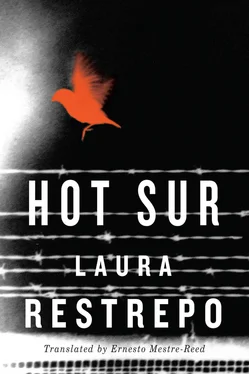“Funny how the mind works, María Paz,” Bolivia told me when we were in America. “The day of my mother’s burial, I thought of her surrounded by sick people, but healthy herself. Healthy and with her old-fashioned hairdo and with the knitted shawl over her shoulders that she wore in the photograph in our living room.”
It was only little by little that Bolivia and her brothers began to understand the truth that had been kept from them for so long. After the burial, which in fact had not been a burial at all but a cremation, permitted by the church for deaths from contagious diseases, the family had to stay overnight, three to a cot, at an inn at the halfway point of the journey back. It was only there, in the insomniac mugginess of that night, that Bolivia finally figured out that during all those years of her absence, her mother must have been just like those sick folk who hid their putrefied flesh with rags.
Why did my mother choose that specific object, my grandmother Africa’s coscoja, for our farewell ceremony so many years later? She never told me, and when I asked her, she’d use any pretext to change topics: “Do you want more chocolate milk?” Or “Turn on the TV, María Paz, the telenovela is on.” So I had to go digging for answers on my own. And I can assure you, Mr. Rose, that the things I began to discover did not put my mind at ease. My mother had told me about what she called the great secret of the family, the unnamable illness of my grandmother Africa. But that was just the beginning. The real secret, the secret behind the secret, I had to figure out myself. It had to do with a dark well without memories, the years in which my mother and her brothers grew up in the absence of their own mother, that woman who had been denied and made to disappear, that mother whose name the father never again spoke aloud, that living corpse whose children could not ask questions about, that undeclared orphanhood, that absence of maternal love that was never explained, the horror of that muted nightmare. That blind point of panic and darkness in the hearts and heads of those children who no one thought it necessary to make things evident for. I can’t help but think of my mother at sixteen years old, the willowy pretty girl she must have been, saving from those ashes of disgrace that coin that contained some vestige of memory, or perhaps healing or redemption. I also can’t help but think of my mother, already a woman in her own right, having my abandoned grandmother’s coin broken into three parts so she’d leave a legacy for her daughters whom she was about to abandon.
Bolivia paid a jeweler to cut the coin and on each piece place a ring through which the chain would pass. That’s what she had decided, but the rest of it, what I’m going to tell you about now, was fate, like everything else that has happened to me. And you, who are a professor and more importantly a writer, know that fate means chance, luck, coincidence — something that happens to you not because you want it to happen but because it is destiny. Don’t think that I haven’t looked up such things in dictionaries. Because that’s exactly what happened, that the word “lazareto” engraved in the coscoja happened to be divided like this: L-AZAR-ETO, and because the middle piece was mine, mine said and still says, AZAR, Spanish for fate. You figure out the consequences. Imagine, in particular, everything that can happen to you from the moment that your own mother brands you with such a word by hanging it around your neck.
After our ceremony, each of us with her medallion, we went out on the street, clean and freshly ironed on the outside and full of foreboding on the inside. We left Violeta and her cardboard box at the house of her godmother, Doña Herminia, who would care for her. Violeta passed peacefully from the arms of her mother to those of her godmother, which did not surprise us because we had already began to sense that Violeta was Violeta. But what did Bolivia feel on leaving her baby, so pretty and so innocent, in the hands of someone else? That I never found out. Many things cannot be known. Was Violeta really strange from the time before Bolivia left for America, or did she become strange because who knows what could have happened at Doña Herminia’s house, where no one was there to defend her or give her proper company. That was one of those mysteries that Bolivia refused even to acknowledge, always finding some excuse to avoid the heart of those truths. Chocolate milk, the telenovela, anything to pretend she didn’t know what you were talking about. The past, our past, her own past, what may have happened during the years of separation, none of those were topics she ever agreed to discuss. She made us believe the page was blank: zero memories, zero regrets. As if our lives had begun at the moment of that second ceremony we had five years later, at John F. Kennedy Airport in New York, when, worn out by the heat and fatigue, we finally brought together the three pieces of the coscoja again.
Sorrows do not exist if they’re not named, that was Bolivia’s philosophy. Her native country had been left behind. And the past forgotten. She wasn’t a woman who dwelled on nostalgia, my mother, or bet against impossible odds. She prided herself on being practical, remaking herself endlessly. “Don’t look back,” she’d say, and was committed to moving us forward without too many complications. She had to feed us, so she provided food; we needed a roof over our heads, and she arranged for that. “Pulling us forward,” she always said, and I suspect she never noticed how twisted we were coming out — really more sideways than forward. There were so many things we never knew or talked about, and that burn inside us with a dark resplendence. Coins rescued from the ashes — I’m telling you about this side of my mother, Mr. Rose, because I know that there shouldn’t be any secrets when I write. You need to know that because of this, Bolivia’s silences, it was difficult to grow up with her, to be secure, to become an adult, and remember that after five years apart, we got there only to live together like strangers. You can’t blot out the sun with your thumb, and the three pieces of a coin brought back together didn’t change the fact that none of us really knew who the other two were. Remember that when you write about all this. The things we dared not talk about forced us to live in constant fear, confined in a narrow box. I sometimes wonder if it wasn’t that web of big and small lies that tangled up Violeta’s mind.
“It’s only for a few months,” Bolivia told Doña Herminia when she handed her Violeta. “Take care of her as if she were your own; you’ll be well compensated.” Then the two of us headed for the bus terminal. In one of the many yellow buses with red stripes, I journeyed to the city where Leonor de Nava, kin to my mother, lived with her daughter Camila, who was two years older than I was, and Patricia, who was my age. They called them Cami and Pati, and because their last name was Nava, they were nicknamed Caminaba, which means walked, and Patinaba, or skated. I’d live with them until my reunion in America with my mother and sister. Pressing the piece of the coscoja in my hand, I looked at Bolivia one last time from the window of the bus. I thought that she looked awfully young with her backpack, her plaid shirt, and without daughters, and for a moment I got the feeling that she was getting rid of us. “It’s only a few months,” her mouth said, enunciating the words exaggeratedly so that I could see them through the glass that prevented me from hearing them. Only a few months, and then America!
Only a few months. But five years passed before I saw Bolivia and Violeta again.
4. Interview with Ian Rose
“The only thing I have left now is to wander with my pack of dogs, animal among animals,” Ian Rose tells me. He agreed to have breakfast with me at the dining room of the Washington Square Hotel, where I’m staying now that I have come to New York to interview him for this book.
Читать дальше












